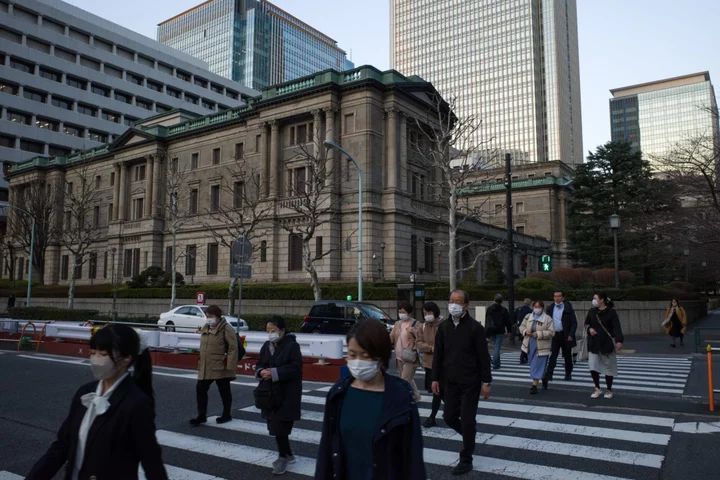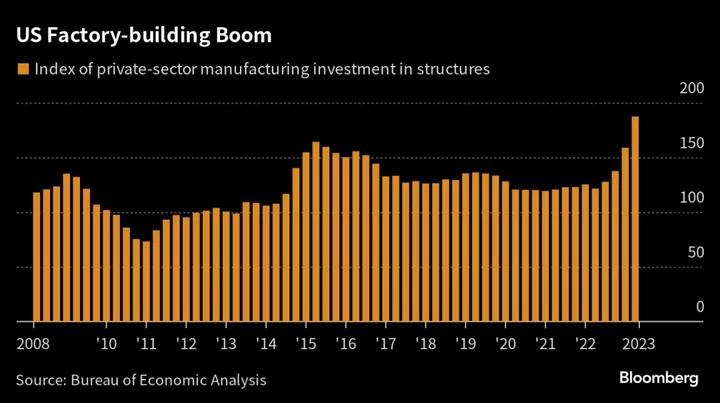The Bank of Japan may scrap negative interest rates by the end of this year to adjust the currently excessive level of monetary easing, according to a former BOJ board member.
“They could do it at any time and it won’t be a surprise, given the current economic recovery,” ex-board member Makoto Sakurai said in an interview Wednesday, explaining that real interest rates have fallen significantly. Under Governor Kazuo Ueda “the BOJ has appeared cautious, but they have steadily taken policy actions at a faster pace than expected,” Sakurai said.
That’s why there’s a chance that the world’s last major central bank holding onto negative rates could get rid of the unorthodox policy as early as Oct. 31, Sakurai said. The sub-zero policy is largely symbolic, and raising it won’t have much impact on the real economy compared with raising the ceiling on 10-year yields for example, he added.
Still, he also mentioned the caveat that given existing communication from the bank and the potential for criticism in parliament, the BOJ may opt for scrapping negative rates in December or thereafter.
Sakurai was one of nine board members under then Governor Haruhiko Kuroda from 2016 to 2021, and was then seen as someone who played a leading role in indicating the consensus for BOJ policy. He predicted the bank may widen its long-term yield target band as early as fall 2022, before the BOJ did just that in December. Sakurai is known for his closeness to Kuroda, and also knows Ueda well.
The former board member also made the point that negative rates are likely to be abandoned before the bank raises the ceiling of its yield curve control program.
Unlike many BOJ watchers, Sakurai saw the hurdle to further adjust yield control as higher than scrapping negative rates. That’s because the ceiling for long-term yields is already at 100 basis points, and raising it to 150 for instance could cause problems in Japan’s financial system or add stress to the fiscal environment, he said.
“Changing the negative rate would lead to slight changes in the shape of the yield curve,” Sakurai said. “But the overall curve has already risen so it’s ok for the furthest part of short-term rates to increase.”
According to Sakurai’s calculation, Japan’s real interest rates are now around the lowest level since the yield curve control program was introduced in 2016. That’s one indication there is too much easing, and suggests that the next BOJ move is more likely to address that, rather than aim to enhance stimulus sustainability, he said.
“There is too much extraordinary monetary easing now,” Sakurai said. “The problem with that is it does unnecessary things like continuing to expand the BOJ’s balance sheet.”
Sakurai’s negative rate shift prediction is more hawkish than the current consensus. None of the economists surveyed in Bloomberg’s September poll expected a scrapping of sub-zero rates by the end of the year, and only around 9% forecast it for January. Another 50% expected it between April and July.
There’s been some precedent for Governor Ueda taking actions that are more hawkish than market expectations. He got rid of rate guidance in his first policy meeting in April, and adjusted yield curve control in July, surprising market players who were convinced that Ueda was communicating dovishness. While he was widely seen as a dove at the start of his tenure, 65% of economists saw his stance as neutral in last month’s survey.
Scrapping negative rates this month may also be difficult as another diet session starts later this week, raising the risk that politicians would slam the bank for the sudden shift. That’s something the BOJ may think about, Sakurai said. If there is no action on rates this month, Ueda’s BOJ could adjust forward guidance to indicate changes are coming, he said.









